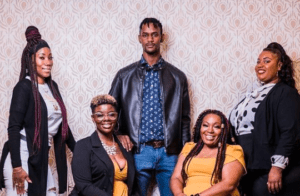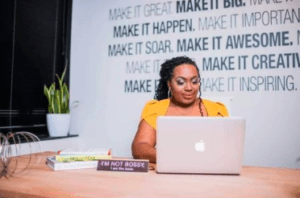Cyntoni Miller + Saiduo Diallo – Founders, Black on the Job and Jobbee Academy
Diversity in Entrepreneurship
Cyntoni and Saiduo are the founders of Black On The Job and Jobbee Academy. Black on the Job is a full service career development community for people of color. Their purpose is to inspire forward momentum in each person’s career using mentoring, skills enrichment and community engagement. Each member of Black On The Job has access to a full network of black career professionals to assist with their process of identifying their career objectives and adapting to new corporate cultures as a person of color.
Tell us about yourself, Cyntoni.
“I grew up in foster care in Compton, California. I always had a knack for always figuring things out on my own and I was doing that. It was not because I was in foster care that I couldn’t figure things out but as a society, black people, we just don’t have those things laid out for us. So even if you were to try to collaborate or communicate with other black people who are in their profession, they will usually say, “We’re all just winging it.” Yeah, I just thought in my head, there has to be a way to set people up for success so that someone else doesn’t have to wing it.
Saiduo’s story is kind of similar because he came here from Senegal three years ago. When he got here there weren’t a ton of resources on how to succeed in America as a Black African. So his mindset was like, well, there’s Black people here already so let me just see how the Black Americans are doing it. We were just looking at each other thinking neither of us have a road map. So we’re like, OK, we have to create a road map where it’s a little bit more accessible to climb the ladder. So we started Black on the Job, June of 2018.”
What are some of the things Black on the Job tackles?
“Black on the job is its own beast. Not only do we do resumes, career coaching but also mock interviews, salary negotiations and leadership training.
Through our Facebook group we provide a lot of resources and information about how to have important conversations with executive boards, how to set up performance improvement plans and document that information so then when you have your performance review you can say “I’ve achieved this over these past months in the quarter, I’ve created this much opportunity for the company and now I am requiring this and this is what the market value is for this position and what I’m valued at this position and this is why I’m negotiating this salary.”
“ It’s not that black people are not educated , experienced or have talent. They just are not selling themselves. I felt like we could fix that. It’s not like we have to learn something, but basically black people need someone to say, you know, you’re doing great, but now we’ve got to write it.”
What are you passionate about?
“My passion lies in seeing black people happy. I think that our happiness a lot of times, in America, mostly is tied to how much we make. I have a big motto; Black people are mirrors, so whatever I see in you is a reflection in what I see in myself and I just want to clean the mirrors. With cleaning the mirrors of other Black people I’ve been able to learn more about myself and that’s what brings me joy. The more people I get to help say I got the job makes me feel like I got the job too. It’s like a win-win.
 That’s one fold of it, the second fold of it is creating more of a unification within the Black race. Black on the Job has a very intentional mission when it comes to our hiring practices. We value paying Black Africans in African countries an American wage so that we can extend the olive branch from a Black American stand point. We see it as an olive branch between two cultures in one race but also so that our buying power is not limited to just America. We try to make sure and show that it’s two sides of the same coin.
That’s one fold of it, the second fold of it is creating more of a unification within the Black race. Black on the Job has a very intentional mission when it comes to our hiring practices. We value paying Black Africans in African countries an American wage so that we can extend the olive branch from a Black American stand point. We see it as an olive branch between two cultures in one race but also so that our buying power is not limited to just America. We try to make sure and show that it’s two sides of the same coin.
My goal is that when you have a Black African or Black American working at the same company they look out for one another. There is strength in numbers.”
What is one of the biggest lessons that you learned?
“The biggest lesson I learned was to listen to the community and what their needs are. I had to battle thinking that because I am a Black woman I know exactly what Black women need and having to say “Shut up we’re not a monolith and we all have different needs”, and I learned that lesson a very very hard way. With that lesson we were able to diversify our hiring practices and now we have people of all faiths, army vets, disabled, single mothers and we based it off our community instead of basing it off what’s in me. Now we have 70,000 members globally but I feel like I have 70,000 bosses and they tell me what to do now, so the hard lesson was to listen.”
“We have a statement within our mission that says, Black people will succeed if they are given the right tools. We believe if we provide the right resources people will use them.”
Where do you hope to see Black on the Job in the future?
“We have three different new phases that we want to kick out by 2025. One phase is creating a staffing agency. The second phase is to partner with other organizations that are not in America, connecting with the UK, Canada and different African countries to create Black on the Job communities within those countries. In Kenya we have 300 members so our Kenyan bee’s are set but we want to flesh that idea out more. Our third phase is launching Black on the Business where we help Black entrepreneurs scale up to six figures. “


